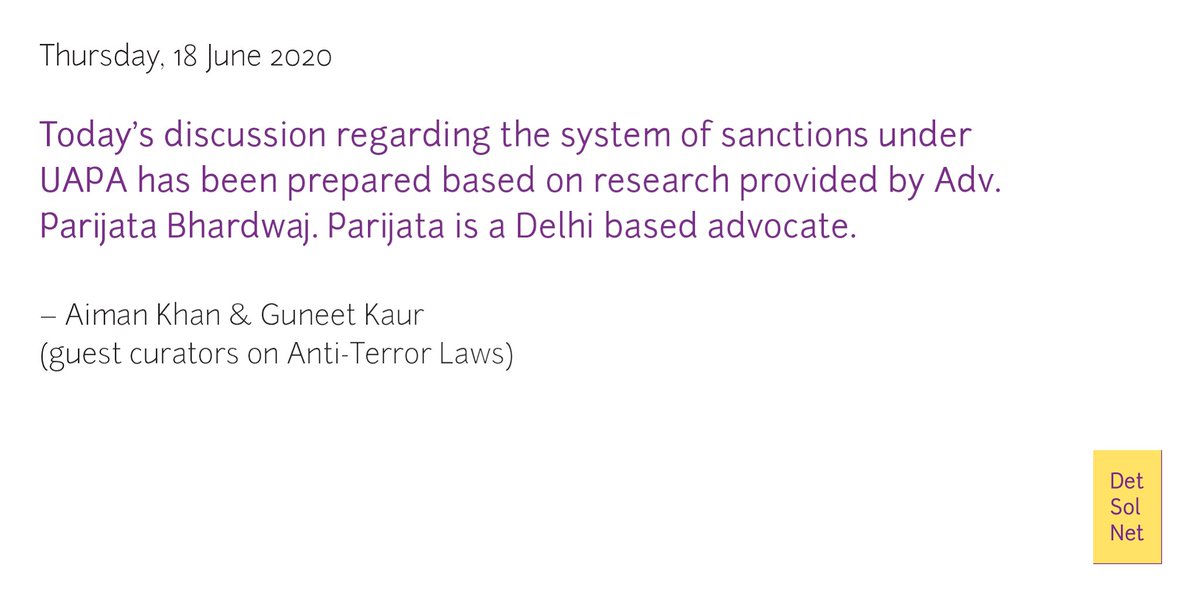Hello, we are @guneetkaurahuja and @aimanjkhan, today we will look at the system of sanctions under UAPA. This discussion is curated based on notes and research done by Advocate Parijata. She is a Delhi based lawyer. 1/n
To prevent UAPA from being applied indiscriminately & keep its use in check: there is a system of sanctions. This requires prosecution to get an authorisation from a designated authority, without which, court cannot legally take notice of the case and start the proceedings. 1/n
The law regarding sanctions is enumerated in Sec. 45 of the Act.The Supreme Court has held that the lack of a valid sanction vitiates the entire trial under UAPA (Ashraf khan @ Babu Munne khan v. State of Gujarat (2012) 11 SCC 606). 2/n https://indiankanoon.org/doc/140891030/ ">https://indiankanoon.org/doc/14089...
The law regarding sanctions is enumerated in Sec. 45 of the Act. The Supreme Court has held that the lack of a valid sanction vitiates the entire trial under UAPA (Ashraf khan @ Babu Munne Khan v. State of Gujarat (2012) 11 SCC 606). 3/n
The Act requires the State or Central government (depending on the provision being applied) to set up an Authority. Depending on the provisions sought to be applied or the investigating authority, the authority is either at the State level or the Central Level. 4/n
For cases investigated by the National Investigation Agency (NIA), the approval is done at the Central level. Center can transfer an ongoing state UAPA investigation to the NIA & this provision can be abused for political gains. 5/n
We saw the misuse of this power in the #BhimaKoregaonCase where several Human rights defenders have been wrongfully implicated. When there was a shift in government in Maharashtra, the central government arbitrarily transferred the investigation to NIA. 6/n
The Investigating Officer should submit all the evidence and all materials relating to the section and place it for the independent perusal of the Reviewing Authority. Any material found to benefit the Accused, must also be provided to the Authority. 7/n
The act requires that after receipt of the material, the Reviewing Authority should independently, without any pressure, apply their mind to the material and come to an independent conclusion regarding the applicability of the provisions under UAPA. 8/n
If they find the material to be insufficient, they can refuse to give sanction. There have been cases, where the authority has given a recommendation for further investigation also. 9/n https://www.thehindu.com/news/national/kerala/authority-has-final-say-in-uapa-cases/article29871441.ece">https://www.thehindu.com/news/nati...
This exercise of reviewing material & coming to a conclusion, should be completed within 7 days of receiving the material from the police. This recommendation is then forwarded to the concerned government which must apply its mind & comes to a conclusion independently. 10/n
1) The test to determine whether the sanctioning authority has independently applied their mind is varied and has evolved on a case by case basis. However, some of the basic things to check include- 11/n
Sanctions are accorded in a routine manner based on incomplete documents without applying their minds to the material provided, treating this important process as a checkbox exercise. Material provided should give a complete and accurate representation of the case. 12/n
2) The Sanction Order itself often is replete with errors. These might be errors regarding dates, the sections applied, or also the wording of the order itself. Courts have held that vague allusions without elaborating on the keys facts show non-application of mind. 13/n
The Supreme Court has held that in light of the stringent provisions of the UAPA, - an Act which invades personal liberty, it is imperative that this process of granting sanction be followed to the T. Thus, a sanction is only valid if - 14/n
1. All materials, including materials, which are beneficial to the Accused are presented to the Reviewing Authority and Sanctioning Authority. 15/n
2. The authority independently applies his/her mind to the material and comes to a conclusion regarding the applicability of the provision. 16/n
3. The recommendation should be given within 7 days of receipt of the material. A delay vitiates the sanction. 17/n
4. After receiving the recommendation the concerned government must independently decide on whether to prosecute or not within 7 days of receiving the same.18/n
It is important to note that an invalid sanction vitiates a trial only with regard to the provisions under the UAPA and not other sections. Thus, if there are charges under the IPC, the trial for the same can still be conducted. 19/n
This process of granting a sanction - that an accusation made under UAPA is applicable - is far from a formality but critical to ensuring UAPA is not used arbitrarily. These measures have been put in place especially because the UAPA is stringent and invasive. 20/n
These measures have to be adhered to scrupulously, in letter & spirit. The stringent and invasive provisions of the Act, mandate that the checks put in place like the sanction must be, scrupulously adhered to both in letter and spirit. 21/n
However, lawyers working on UAPA cases have often experienced that sanction is treated as a file forwarding exercise, and lower courts, including some high courts, can be pliant with the sanction process requirements despite the strict requirements of the law. 22/n
We thank Parijata for preparing the material for today& #39;s thread.
Thank you for joining us. Feedback, questions, and additional points are always welcome.
Thank you for joining us. Feedback, questions, and additional points are always welcome.

 Read on Twitter
Read on Twitter


